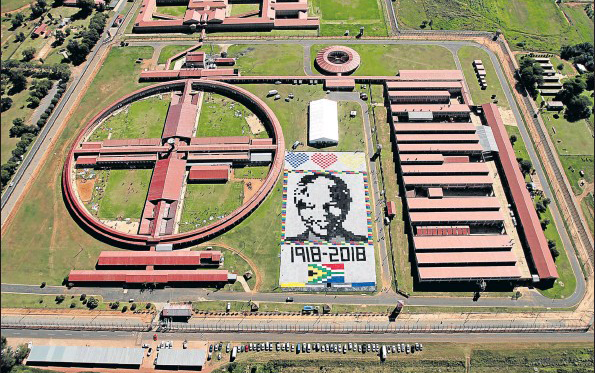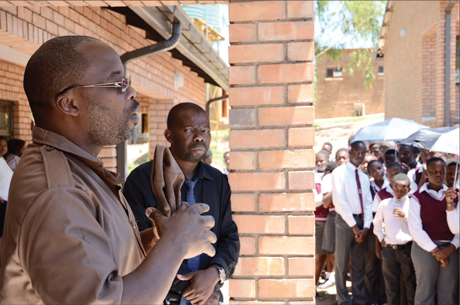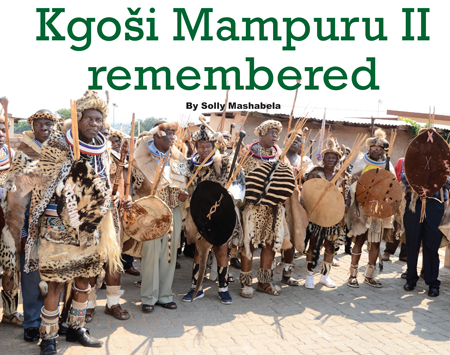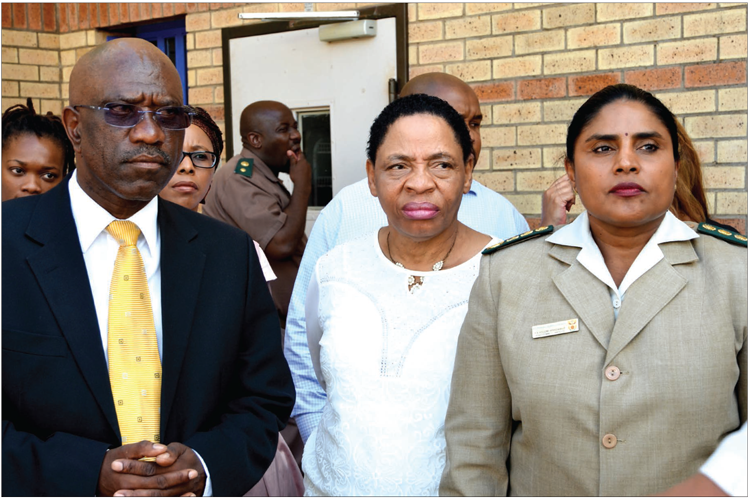Mandela Rules
Zonderwater shows off giant blanket of Madiba’s portrait


More than a 1000 guests gathered at Zonderwater Management area on 24 April 2018 to witness the unveiling of a 7 956 square metre portrait blanket of the iconic anti-apartheid leader and first president of a democratic South Africa, Dr Nelson Rolihlahla Mandela. The blanket, named the Massive Mandela Masterpiece (MMM) was a contribution by 67 Blankets for Mandela Day in collaboration with DCS to celebrate what would have been Madiba’s 100th birthday this year.
The colourful portrait consists of more than 3 000 squares of wool blankets that were stitched together and laid out on the Zonderwater sports field in the morning of the event. The gigantic image, larger than the size of a rugby field could not be comprehended from the ground. Guests viewed the breath taking artwork on two big screens through the lens of a drone flown over it to capture the image from above.
“The collage of colour, beauty and artistic symbolism that this portrait displays speaks of a nation seeking to repaint itself in the image of arguably one of the greatest icons ever known to humankind, Tata Madiba,” said Minister Michael Masutha about the Massive Mandela Masterpiece.
Minister Masutha used the platform to advocate for inmates who are on parole or those who have served their sentences to be considered for employment opportunities. He said they should have equal access to employment and other forms of economic activity where they can apply some of the skills they learned from participating in various training programmes offered in correctional centres. He said that this would ensure that they are successfully reintegrated into society and become a positive influence in their communities. Of the 70 000 potential workers, consisting of ex-offenders and parolees, only two percent is afforded the opportunity of employment, Minister Masutha said.
Deputy Commissioner Personal Development, Dr Minette Plaatjies marked the day as highly successful and appreciated the hard work of all officials and inmates in making the MMM project a success. Deputy Director Programme Design and Development, Nontobeko Redman, who was the coordinator of the project on behalf of DCS, thanked officials who volunteered to coordinate the project in the regions, and 67 Blankets ambassadors and knitwits who went to some of the facilities to teach inmates how to crochet. She applauded the inmates for their willingness and commitment to the project.
Oupa Masita, an inmate, crocheted most blankets and has a trophy to show for it. “Knowing that my blankets are going to keep 67 underprivileged people warm this winter makes me very proud. It is a way of giving back to the people I have hurt outside,” said Masita who is serving a 20 year sentence at Zonderwater Management Area for robbery.
Mrs Graça Machel was amongst the dignitaries who attended the unveiling of the MMM. She echoed Madiba’s words saying, “it seems impossible until it’s done.” She applauded Carolyn Steyn for making a difference with the simple idea of knitting and keeping Madiba’s legacy alive.
National Commissioner Arthur Fraser, DCS senior officials, founder of the United Democratic Movement, General Bantu Holomisa, and Kgosi Leruo Tshekedi Molotledi of the Royal Bafokeng nation were some of the prominent figures that graced the occasion.
testing
yu
gjhgjgjh
Test
 rtyurtyutyurtyurtyurtyu
rtyurtyutyurtyurtyurtyu
Minister calls for community activism to fight Vuwani arsonists.

 Minister Michael Masutha has called on the community of Vuwani in Limpopo to ostracise the anarchists who burn down schools during protests. He visited the strife-torn region as part of the department’s back to school campaign on Wednesday, 18 January. Minister Michael Masutha encourages school learners to use education to improve their lives. He visited three of the 14 schools that were burned during the protest at Ha-Mashau in Vuwani. He led a DCS delegation, including parolees to Vhafamadi Secondary School, Mphagane Primary School and Vhudzani Secondary School.
Minister Michael Masutha has called on the community of Vuwani in Limpopo to ostracise the anarchists who burn down schools during protests. He visited the strife-torn region as part of the department’s back to school campaign on Wednesday, 18 January. Minister Michael Masutha encourages school learners to use education to improve their lives. He visited three of the 14 schools that were burned during the protest at Ha-Mashau in Vuwani. He led a DCS delegation, including parolees to Vhafamadi Secondary School, Mphagane Primary School and Vhudzani Secondary School.
Minister Masutha started at the palace of the local traditional leader Chief Tshivhangwaho Mashau to be briefed about the protest that has interrupted schooling on previous occasions. The protests stem from community discontent about the decision by the Municipal Demarcation Board to incorporate their area into the newly formed Collins Chabane Municipality. Chief Mashau told the Minister that 14 schools, a SASSA office, Post Office and a tribal office were burned in the area during the 2016 protests. “People who committed the deeds were not from here,” chief Mashau said.
Vhafamadi Secondary School has since been turned into state-of-the-art buildings comprising three classroom blocks and an office block. Former learners of the school raised funds to rebuild it. However, the grass around the new school had already grown to window level of the buildings due to the recent rains and parolees were brought in to cut it and clean the school yard.
National Commissioner Zach Modise promised that the department will get the parolees to plant trees and pave the yard once paving bricks and trees are procured. He said the visits to schools and communities help the department to identify areas where it can help. Minister Masutha  said the instigators of arson must be seen for the thugs they are, and not be confused with the members of the community who are themselves victims. He said there has been a debate at the highest level of government on whether the schools of Vuwani should be rebuilt or the community be left to their own devices and be viewed as authors of their own misfortune.
said the instigators of arson must be seen for the thugs they are, and not be confused with the members of the community who are themselves victims. He said there has been a debate at the highest level of government on whether the schools of Vuwani should be rebuilt or the community be left to their own devices and be viewed as authors of their own misfortune.
The prevailing argument was that the schools must be rebuilt, which will happen soon. He told the children at Vhafamadi that learning in a modern school will give them the same opportunity as a child in any other part of the country. “We do not want the children of Vuwani to be seen as rural children who are confined to the immediate environment they grew in. They must think for themselves as the next engineers,” he said. Referring to the arsonists, he said, “We need to inspire our community to understand that you may be angered by anything, but you cannot forgive yourself for taking from a child an opportunity to change their life through education.” He said skilling the youth was one of the ways of preventing involvement of youth in such acts. “Once a young person has some skills, they have a sense of pride, even if they are unemployed and will therefore not get involved in things that are detrimental to progress,” he said.
Minister Masutha motivated the leaners to achieve whatever they dream of achieving despite the environment they learn in. He told them never to commit crime for they will end up in correctional centres. The Principal of Mphagane Primary School, Richard Mudau, pleaded with the Minister to help in getting school books delivered to the school as they were becoming desperate.
Minister Masutha led the commemorative celebrations of the life of Kgoši Mampuru II.


The minister delivered the keynote address to the multitudes of attendees comprising of chiefs from other villages and their subjects. Contingents of quests from far were Bakgatla ba Kgafela from Botswana and amaNdebele who both have historical ties with the Bapedi Kingdom. A delegation of amaMpondo from Eastern Cape was also in attendance. The Minister of Public Service and Administration Ngoako Ramatlhodi, Deputy Minister of Labour Phathekile Holomisa, National Commissioner Zach Modise and MECs also attended the celebrations. Kgoši Sekwati Mampuru III leads a procession at the Kgoši Mampuru II annual commemoration. Kgoši Mampuru II remembered
By Solly Mashabela
Delivering the keynote address, Minister Masutha said Kgoši Mampuru II was honoured by naming the former Pretoria Management Area after him because his history symbolises resistance to the colonial rule. He said the honour was not only for Kgoši Mampuru II, but all warriors who had stood up against repression. He said revitalising the Gallows Museum at Kgoši Mampuru II Management Area and finding the remains of victims of the struggle was also part of the agenda to honour those who fought for freedom. “We are here to recognise the strides made by Kgoši Mampuru II. Many fighters like him were given indigent burials in the belief that their memories would be obliterated. That we shall not allow,” Minister Masutha said. He reassured the descendants of Kgoši Mampuru II that the government will not rest until his remains, which have not been found since he was hanged in Pretoria, are found. The recent exhumation of the remains of 14 Poqo, Pan Africanist Congress military wing, fighters gave hope that Mampuru II’s remains will also be found, he said.
Parliament’s select committee praises Tswelopele


Parliament’s select committee praises Tswelopele By Solly Mashabela Parliament’s Select Committee on Security and Justice this week congratulated the department for sterling work done at Tswelopele Correctional Centre. The committee had an oversight visit to the centre on Wednesday, 1 February. The Chairperson of the Select Committee on Security and Justice Dumisani Ximbi (left) and Free State and Northern Cape Regional Commissioner Subashini Moodley on a walkabout at Tswelopele Correctional Centre. Free State and Northern Cape regional management and centre managers made a presentation to the committee on how offenders are housed according to their categories, the programmes they participate in, living conditions at the facility, and how the centre dealt with the transfer of 1 000 offenders from Pollsmoor recently as a means to reduce overcrowding at Pollsmoor. It was followed by a walkabout through the centre.
Free State and Northern Cape Regional Commissioner Subashini Moodley said the region has a lower level of overcrowding mainly due to activities such as referrals to court for conversion of sentences, their participation in the regional Justice, Crime Prevention and Security cluster forum, and the overall reduction of crime in the region. She thanked the South African Police Service (SAPS) for the lower crime levels. Ms Moodley furthermore outlined the partnerships between DCS and nongovernmental health care organisations, and the Department of Health.
Kimberley Management Area has over 400 offenders on Antiretroviral Therapy (ART) and it also has a permanent doctor. Dr Alastair Kantani said what concerned him was the occurrence of remand detainees on ART who stop taking the medication when they are released, only to return after some time in a worse situation. He said some offenders also stretch the centre’s health care by reporting trivial ailments. Regardless, the doctor said since he could attend to most conditions, referrals to outside hospitals were mostly avoided. Committee members were impressed with the neatness and the running of the centre. They said their visit to Pollsmoor Management Area had given them a gloomy picture of the department, but Tswelopele gave them the opposite impression.
They said it was an example of what must be done in all other centres of the department. Committee member Mr Mohapi Mohapi suggested that management should consider the use of inflammable mattresses to prevent offenders from torching centres. Despite their praises, they were concerned over the vacancy rate and the absence of a maintenance contract. “This is a very beautiful centre, but I am worried that in 10 years’ time it will be like Pollsmoor,” committee member Tebogo Mokwele said. She said they will engage the Minister of Public Works. Deputy Regional Commissioner Grace Molatedi said some of the reasons vacancies were not filled were because of austerity measures and the high turnover rate of officials with scarce skills.
Churches to take centre stage in social reintegration

 He said the previous government kept prison life secretive and offenders were isolated from society. He said the department is no longer hiding the faces behind bars because they are also part of the community. Mr Makwetla said the department needed the churches as partners to bring healing and transformation in society. “As a humane society we must have the capacity to forgive and help people to heal, not to perpetuate anger and hostility,” he said.
He said the previous government kept prison life secretive and offenders were isolated from society. He said the department is no longer hiding the faces behind bars because they are also part of the community. Mr Makwetla said the department needed the churches as partners to bring healing and transformation in society. “As a humane society we must have the capacity to forgive and help people to heal, not to perpetuate anger and hostility,” he said.
Deputy Minister Makwetla enjoys a dance with religious leaders during a praise song welcoming him at the Saulsville Methodist Church in Atteridgeville, Pretoria. Members of the Young Men’s Guild at the Methodist Church’s Triennial Convention who are not all youth but young at heart enjoy a dance during a moment of praise as they welcome Deputy Minister Makwetla in the house of worship.
He said if spiritual leaders can be seen next to ex-offenders campaigning against crime and at the forefront of social reintegration, it would be easier for communities to follow the lead. Although the church leaders were eager to strengthen their partnership with DCS, concerns were raised about the department’s bad reputation. Corrupt officials inside correctional centres, reoffending and ‘exaggerated privileges’ given to certain offenders were some of the issues raised.
They also requested that the department equip the church in the role of orientating ex-offenders back to society. The Methodist church proposed that their relationship with the department be officiated by a Memorandum of Understanding. It has plans to manage a halfway house as their contribution to restoring the morals of the youth and assisting with social reintegration. Mr Abner Mathabe who leads the social responsibility arm of the Methodist church said they are already involved in a number of interventions in correctional centres. The invitation to Deputy Minister Makwetla was an attempt by the church to expand its role in restoring moral values in communities.


 jkyfluyfljhv,
jkyfluyfljhv,